新目标英语七年级下册7-12单元短语句子语法
新目标英语 7年级下册 Unit1-12单元 重点短语+句型
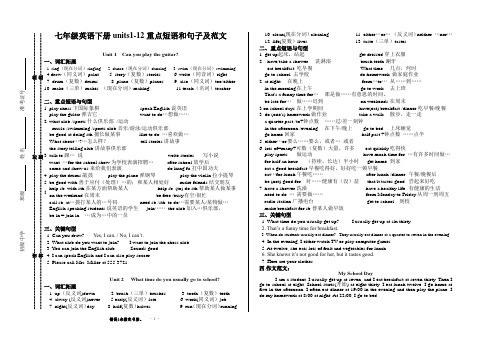
初级中学 班级 姓名 准考证号……………………………密……………………………………………………封…………………………………………线……………………… ……………………………答……………………………………………………题…………………………………………线……………………… 线………………………七年级英语下册units1-12重点短语和句子及范文Unit 1 Can you play the guitar? 一、词汇拓展 1. sing (现在分词)singing 2. dance (现在分词)dancing 3. swim (现在分词)swimming 4.draw (同义词)paint 5. story (复数)stories 6. write (同音词)right 7. drum (复数)drums 8. piano (复数)pianos 9. also (同义词)too/either 10. make (三单)makes (现在分词)making 11.teach (名词)teacher 二、重点短语与句型 1. play chess 下国际象棋 speak English 说英语 play the guitar 弹吉它 want to do …想做…… 2. what club /sports 什么俱乐部 /运动 music /swimming /sports club 音乐/游泳/运动俱乐部 be good at doing sth.擅长做某事 like to do …喜欢做…What about …?…怎么样? tell stories 讲故事the story telling club 讲故事俱乐部3. talk to 跟…..说 write stories 写小说want …for the school show 为学校表演招聘… after school 放学后come and show us 来给我们表演 do kung fu 打中国功夫4. play the drums 敲鼓 play the piano 弹钢琴 play the violin 拉小提琴5. be good with 善于应付(处理)…的;和某人相处好 make friends 结交朋友 help sb. with sth 在某方面帮助某人 help sb. (to) do sth.帮助某人做某事on the weekend 在周末 be free /busy 有空/很忙call sb. at …拨打某人的…号码 need sb./sth. to do …需要某人/某物做…English-speaking students 说英语的学生 join …… the club 加入…俱乐部,be in = join in … 成为…中的一员三、关键句型1. Can you draw? --Yes, I can. / No, I can’t.2. What club do you want to join? -- I want to join the chess club.3. You can join the English club. -- Sounds good.4. I can speak English and I can also play soccer.5. Please call Mrs. Miller at 555-3721.Unit 2 What time do you usually go to school?一、词汇拓展1. up (反义词)down2. brush (三单)brushes3. tooth (复数)teeth4. alway (反义词)never5.early(反义词)late6. work(同义词)job7. night(反义词)day8. half(复数)halves9. run (现在分词)running 10. clean(现在分词)cleaning 11. either …or … (反义词)neither …nor … 12. life(复数)lives 13. taste (三单)tastes二、 重点短语与句型1. get up 起床,站起 get dressed 穿上衣服2. have/take a shower 洗淋浴 brush teeth 涮牙 eat breakfast 吃早餐 What time 几点,何时 go to school 去学校 do homework 做家庭作业 2. at night 在晚上 from …to … 从……到…… in the morning 在上午 go to work 去上班 That's a funny time for … 那是做……有意思的时间。
新目标英语七年级下册7-12单元短语句子语法

对“外表”提问1. –他看起来长得怎么样?-- What does he look like? (有look,用does/do)--他很高,而且他有短的卷头发。
-- He is very tall, and he has short curly hair.①同义句:-- What is he like? (只有like,用is) (用is,like翻译问“像”)区别:-- What does he like? 他喜欢什么?(用does,like翻译为“喜欢”)②区别比较:(1) 他是中等高度/身材:He is of medium height/build. (是of, 前用be动词)(2) 他有中等高度/身材:He has a medium height/build.(是a, 前用have/has)2. 她有一点点胖:She is a little bit heavy. (heavy是形容词,前用be动词)①一点点+形容词:a little bit+形容词= a little+形容词= a bit+形容词;②一点点+名词:a little+名词= a bit of+名词;如:His hair is a little long. = His hair is a bit long.He can speak a little English. = He can speak a bit of English.3. ①They are talking about the tall boy with curly hair. (with翻译为“有着”)(句中已经有了动词talking about,表达“有着”不能再用动词has)②比较:The tall boy has curly hair. (无They are talking about, 表达“有着”用动词has)练:(1) Jim lives in a small house _________ (有着) an interesting garden.(2) Do you remember John, a pop singer __________ (戴着) funny glasses?(3) Do you know the tall man _________ (有着) a big nose?4. 她从不停止讲话:She never stops talking.①句型:停止做某事:stop doing sth②句型:停下来去做某事:stop to do sth练:(1) Class is over. Let’s stop ___________ (have) a rest.(2) The teacher is coming. Let’s stop __________ (talk).(3) – I feel tired and sleepy. – Why not stop __________ (relax)?(4) If you’re tired, you can stop _________ (work).(5) Stop _________ (talk). Listen to me, please.wear glasses any more.5. 他不再戴眼镜了:He doesn’t词组:不再…:not…any more词组:戴眼镜:wear glasses穿一条红色的裙子:wear a red dress穿着某种颜色的衣服:in+颜色如:Do you know the boy in black?6. 没有人知道我:Nobody knows me.语法:someone, somebody, everyone, everybody, nobody均表示“单三”,与之搭配使用的动词也要变“单三”。
新目标七下英语Unit12知识点梳理+课文和单词
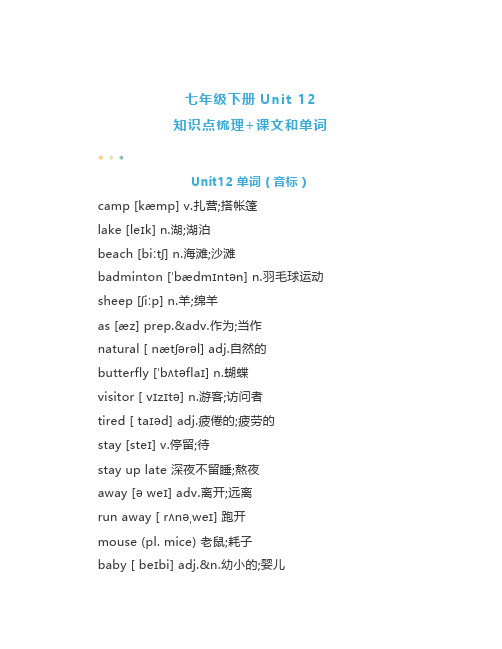
七年级下册Unit 12知识点梳理+课文和单词◆◆◆Unit12 单词(音标)camp [kæmp] v.扎营;搭帐篷lake [leɪk] n.湖;湖泊beach [biːtʃ] n.海滩;沙滩badminton [ˈbædmɪntən] n.羽毛球运动sheep [ʃiːp] n.羊;绵羊as [æz] prep.&adv.作为;当作natural [ nætʃərəl] adj.自然的butterfly [ˈbʌtəflaɪ] n.蝴蝶visitor [ vɪzɪtə] n.游客;访问者tired [ taɪəd] adj.疲倦的;疲劳的stay [steɪ] v.停留;待stay up late 深夜不留睡;熬夜away [ə weɪ] adv.离开;远离run away [ rʌnəˌweɪ] 跑开mouse (pl. mice) 老鼠;耗子baby [ beɪbi] adj.&n.幼小的;婴儿shout [ʃaʊt] v.呼叫;喊叫shout at… 冲……大声叫嚷woof int.(狗叫声)汪汪language [ læŋgwɪdʒ] n.语言fly (flew) v.飞kite [kaɪt] n.风筝fiy a kite 放风筝high [haɪ] adj.&adv.高的(地)high school 中学ago [ə gəʊ] adv.以前India [ ɪndɪə] n.印度tent [tent] n.帐篷put up [ pʊtʌp] 搭起;举起moon [muːn] n.月亮surprise [sə praɪz] n.&v.惊奇;惊讶;使吃惊get a surprise 吃惊snake [sneɪk] n.蛇scared [ /skeəd] adj.惊慌的;吓坏了的move [muːv] v.移动shout to… 对……大声喊叫start [stɑːt] v.开始;着手jump [dʒʌmp] v.跳;跃up and down 上上下下;起伏wake (woke) v.弄醒;醒wake…up 把……弄醒into [ ɪntuː] prep.到……里面;进入forest [ˈfɒrɪst] n.森林ear [ɪə] n.耳朵【重点短语】1. last weekend 上周末2. do one’s homework 做作业3. go to the cinema 看电影4. go boating 去划船5. camp by the lake 在湖边露营6. go to the beach 去海滩7. play badminton 打羽毛球8. on Saturday morning 在周六的早上9. study for the English test 为了英语考试学习10. feed some cows 喂一些奶牛11. work as a guide 做为一个导游工作12. Natural History Museum 自然历史博物馆13. butterfly house 蝴蝶馆14. over 200 kinds ofbutterflies 超过200多种蝴蝶15. tell sb about … 告诉某人关于…16. living habits 生活习惯17. be kind of tired 有点儿累19. stay up 熬夜20. play with sb. 和某人玩21. lose things 丢东西22. run away 跑开23. fly a kite 放风筝24.as a special gift 作为一个特殊的礼物25. take sb. to sp. 把某人带到某地26. go camping 去露营27. put up the tents 搭建帐篷28. make a fire 生火29. keep sb. warm 使某人保持温暖30. on the first night 在第一天晚上31.so...that... 如此…以至于…32. go to sleep 去睡觉33. get a surprise 吃惊34. see sb. doing sth. 看见某人正在做某事35. jump up and down 上蹦下跳36. climb onto one’s back 爬到某人背上37. shout at/shout to 大声喊叫38 wake …up 把...弄醒39. move into… 移入,爬进…中40. a useful lesson 有用的一课【重点句型】1.---What did you do last weekend?你上周末做了什么?---Well, on Saturday, I played badminton.噢.周六我打羽毛球了。
七年级英语下册Unit7单元语法专题_GrammarFocus作业课件新版人教新目标版
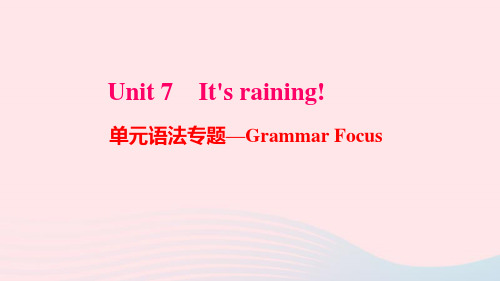
三、按要求完成下列句子。 11.How is the weather?(改为同义句) __W__h_a_t'_s _th_e_w_e_a_t_h_e_r _li_k_e__? 12.He usually plays computer games in the morning.(用now改写) He _i_s p_l_a_y_in_g___ computer games now. 13.They are watchiarents.(改为否定句) They __a_re_ n_o_t___ watching TV in the room with their parents.
14.Helen usually plays volleyball with Mike.(改为一般疑问句) _D__o_es_ Helen usually __p_la_y_ volleyball with Mike? 15.The children are doing_their_homework right now.(对画线部分 提问) W__h_a_t a_r_e_ the children _d_o_i_n_g right now?
C.is listening to a CD D.listens to a CD
( A )9.—________ you ________ English every morning? —Yes,but now I am reading Chinese. A.Do;read B.Are;read C.Are;reading D.Do;reading ( B)10.—Is it snowing in Tianjin today? —________. A.Yes,it isn't B.Yes,it is C.No,it is D.No,it doesn't
新目标英语七年级(下)Unit_7知汉要点归纳

知1.—How is the weather?—It’s raining./It’s sunny.———天气怎么样?———天下雨了。
/天气晴朗。
2.—How’s it going?—It’s great.———最近怎么样?———很好。
3.—What are they doing?—They’re playing basketball inthe park.———他们在干什么?———他们正在公园里打篮球。
4.—What’s John doing now?—He’s playing soccer.He playssoccer every day.———约翰现在在干什么?———他在踢足球。
他每天都踢足球。
【重点词汇】1.rain.下雨.雨水15.snow下雪.雪2.windy有风的;多风的16.cloudy多云的3.sunny.晴朗的17.weather.天气4.dry干燥的18.cold寒冷的;冷的5.hot热的19.warm温暖的6.soon不久;很快20.hard努力地困难的7.skate滑冰21.visit拜访;参观8.message信息;消息22.summer.夏天;夏季9.winter冬天;冬季23.vacation假期10.take a message捎个口信;传话24.call(sb.)back(给某人)回电话11.have a good time玩得开心25.on(a)vacation度假12.right now此刻;马上26.no problem没有问题13.study hard努力学习27.visit friends拜访朋友14.not too bad不算太坏28.play computer games玩电脑游戏【重难点句子】32Copyright©博看网. All Rights Reserved.。
新目标英语七年级(下)1-12单元必背句子与短语

七下1—6单元必背句子与词组Unit1 Where’s your pen pal from? (ok)1. --你的笔友来自哪里? -- Where is your pen pal from? (无―实义动词come, 用is/are‖) --他来自加拿大。
-- He/She is from Canada.同义句:-- Where does your pen pal come from? (有―实义动词come, 用do/does‖) -- He/She comes from Canada.来自:be from = come from练:They’re _______ Australia, a beautiful country.A. come fromB. comes fromC. fromD. for2. --你的笔友来自加拿大吗?-- Is your pen pal from Canada? (用法同上)--是的。
-- Yes, he/she is.同义句:-- Does your pen pal come from Canada? (用法同上) -- Yes, he/she does.3. 他来自澳大利亚:He is from Australia. 他是澳大利亚人:He is Australian.4. --你的笔友住在哪里?-- Where does your pen pal live?--他住在多伦多。
-- He/She lives in Toronto.居住在某地:live in sp练:-- When _____ the girl _____ her homework? -- In the evening.A. does, doesB. does, doC. is, doD. is, does-- _______ your sister have a pen pal? Yes, she _______.A. Is, isB. Does, doC. Can, canD. Does, does-- Ling Tao is a Chinese, but now he _______ in the UK.A. liveB. isC. is fromD. comes from5. --你的笔友说什么语言?-- What language does your pen pal speak?--他说英语。
新目标(Go for it)版七年级英语下册各单元知识点总结
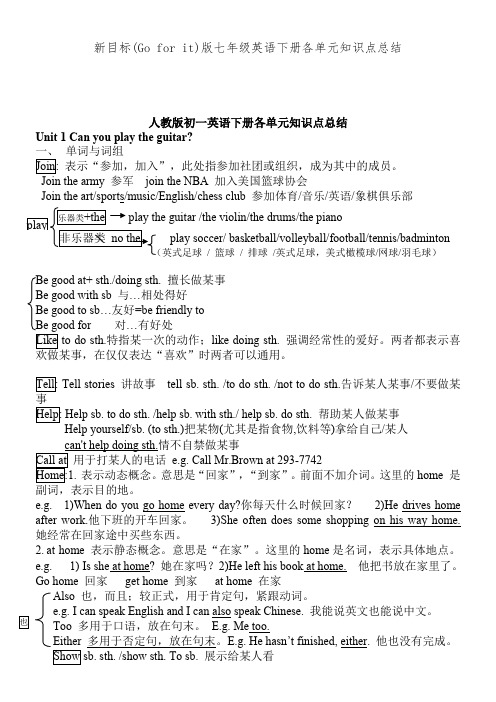
新目标(Go for it)版七年级英语下册各单元知识点总结人教版初一英语下册各单元知识点总结Unit 1 Can you play the guitar?一、 单词与词组表示“参加,加入”,此处指参加社团或组织,成为其中的成员。
Join the army 参军 join the NBA 加入美国篮球协会Join the art/sports/music/English/chess club 参加体育/音乐/英语/象棋俱乐部play soccer/ basketball/volleyball/football/tennis/badminton / 篮球 / 排球 /英式足球,美式橄榄球/网球/羽毛球)Be good at+ sth./doing sth. 擅长做某事Be good with sb 与…相处得好Be good to sb …友好=be friendly toBe good for 对…有好处特指某一次的动作;like doing sth. 强调经常性的爱好。
两者都表示喜讲故事 tell sb. sth. /to do sth. /not to do sth.告诉某人某事/不要做某帮助某人做某事Help yourself/sb. (to sth.)把某物(尤其是指食物,饮料等)拿给自己/某人e.g. Call Mr.Brown at 293-7742意思是“回家”,“到家”。
前面不加介词。
这里的home 是e.g. 1)When do you go home every day?你每天什么时候回家? 2)He drives home after work.他下班的开车回家。
3)She often does some shopping on his way home. 她经常在回家途中买些东西。
2. at home 表示静态概念。
意思是“在家”。
这里的home 是名词,表示具体地点。
新版新目标英语七年级下册期末考试(句型、语法)附参考答案
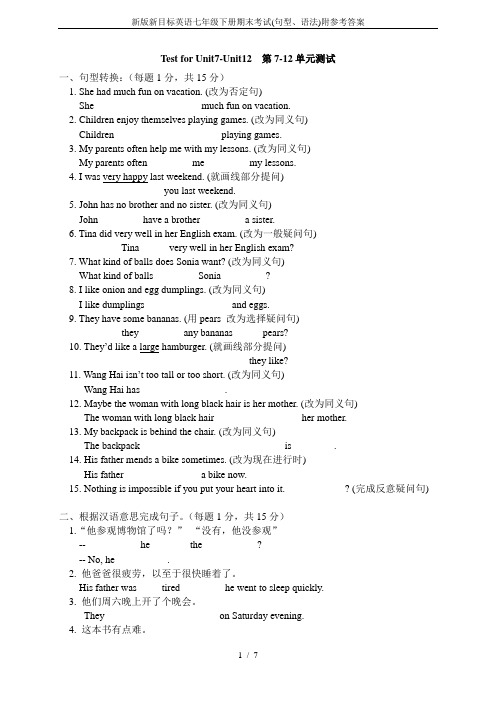
Test for Unit7-Unit12 第7-12单元测试一、句型转换:(每题1分,共15分)1. She had much fun on vacation. (改为否定句)She __________ __________ much fun on vacation.2. Children enjoy themselves playing games. (改为同义句)Children __________ __________ playing games.3. My parents often help me with my lessons. (改为同义句)My parents often ________ me ________ my lessons.4. I was very happy last weekend. (就画线部分提问)________ ________ you last weekend.5. John has no brother and no sister. (改为同义句)John ________ have a brother ________ a sister.6. Tina did very well in her English exam. (改为一般疑问句)________ Tina _____ very well in her English exam?7. What kind of balls does Sonia want? (改为同义句)What kind of balls ________ Sonia ________ ?8. I like onion and egg dumplings. (改为同义句)I like dumplings ________ ________ and eggs.9. They have some bananas. (用pears 改为选择疑问句)________ they ________ any bananas _____ pears?10. They’d like a large hamburger. (就画线部分提问)________ ________ ________ ________ they like?11. Wang Hai isn’t too tall or too short. (改为同义句)Wang Hai has ________ ________.12. Maybe the woman with long black hair is her mother. (改为同义句)The woman with long black hair ________ ________ her mother.13. My backpack is behind the chair. (改为同义句)The backpack ________ ________ ________ is ________.14. His father mends a bike sometimes. (改为现在进行时)His father _______ _______ a bike now.15. Nothing is impossible if you put your heart into it. ______ _____? (完成反意疑问句)二、根据汉语意思完成句子。
- 1、下载文档前请自行甄别文档内容的完整性,平台不提供额外的编辑、内容补充、找答案等附加服务。
- 2、"仅部分预览"的文档,不可在线预览部分如存在完整性等问题,可反馈申请退款(可完整预览的文档不适用该条件!)。
- 3、如文档侵犯您的权益,请联系客服反馈,我们会尽快为您处理(人工客服工作时间:9:00-18:30)。
Unit7 What does he look like?对“外表”提问1. –他看起来长得怎么样?-- What does he look like? (有look,用does/do)--他很高,而且他有短的卷头发。
-- He is very tall, and he has short curly hair.①同义句:-- What is he like? (只有like,用is) (用is,like翻译问“像”)区别:-- What does he like? 他喜欢什么?(用does,like翻译为“喜欢”)②区别比较:(1) 他是中等高度/身材:He is of medium height/build. (是of, 前用be动词)(2) 他有中等高度/身材:He has a medium height/build.(是a, 前用have/has)2. 她有一点点胖:She is a little bit heavy. (heavy是形容词,前用be动词)①一点点+形容词:a little bit+形容词 = a little+形容词 = a bit+形容词;②一点点+名词:a little+名词 = a bit of+名词;如:His hair is a little long. = His hair is a bit long.He can speak a little English. = He can speak a bit of English.3. ①They are talking about the tall boy with curly hair. (with翻译为“有着”)(句中已经有了动词talking about,表达“有着”不能再用动词has)②比较:The tall boy has curly hair. (无They are talking about,表达“有着”用动词has)练:(1) Jim lives in a small house _________ (有着) an interesting garden.(2) Do you remember John, a pop singer __________ (戴着) funny glasses?(3) Do you know the tall man _________ (有着) a big nose?4. 她从不停止讲话:She never stops talking.①句型:停止做某事:stop doing sth②句型:停下来去做某事:stop to do sth练:(1) Class is over. Let’s stop ___________ (have) a rest.(2) The teacher is coming. Let’s stop __________ (talk).(3) – I feel tired and sleepy. – Why not stop __________ (relax)?(4) If you’re tired, you can stop _________ (work).(5) Stop _________ (talk). Listen to me, please.5. 他不再戴眼镜了:He doesn’t wear glasses any more.词组:不再…:not…any more词组:戴眼镜:wear glasses穿一条红色的裙子:wear a red dress穿着某种颜色的衣服:in+颜色如:Do you know the boy in black?6. 没有人知道我:Nobody knows me.语法:someone, somebody, everyone, everybody, nobody均表示“单三”,与之搭配使用的动词也要变“单三”。
如:(1) Everyone in my class __________ (know) this smart teacher.(2) Do you think everyone __________ (enjoy) their weekends?(3) Everyone in our class _______ the weekend.A. enjoysB. enjoyC. enjoyedD. enjoying7. 在七年级五班:in Class Five, Grade Seven (班级、年级、数字的“首字母”均需大写)8. 篮球队的队长:the captain of the basketball team (有of,需要倒翻)①有“生命”的东西,表示“的”用 ’s ; 如:He is my father’s friend.②无“生命”的东西,表示“的”用of . 如:Here is a photo of my family.9. 形容人的“外貌特征”的名词和形容词序号跟在be后 (be+形容词)跟在have/has后(have/has+名词)1是高的/矮的 is tall/short 有长/短头发have long/short hair2是中等高度is of medium height 有直/卷头发have straight/curly hair3是胖的/瘦的 is heavy/fat,thin有黑/黄头发haveblack/yellow hair4是中等身材is ofmedium buildhave+长短+直卷+颜色+hair5是长的/短的islong/shorthave a mediumheight/build6是漂亮/丑陋的isbeautiful/uglyhave (two) big eyes7是可爱的 is cute 有一张圆脸:have a round face10. 受某人的欢迎:be popular with sb 受欢迎的:popular对某人友好:be friendly to sb 友好的:friendly11. 讲笑话:tell a joke, tell jokes 讲故事:tell stories开玩笑:play a joke, play jokes 开某人的玩笑:play jokes on sb12. 有一副新的面貌:have a new look (此处的look作“名词”)13. 去买东西:go shopping在购物商场购物:shop at the mall14. (1) look v. 看起来;如:He looks like his father.(2) look prep. 外表;如:He has a new look.15. (1) like v. 喜欢;如:What does he like?(2) like prep. 像;如:What is he like?Unit8 I’d like some noodles.1. --你想要什么?-- What would you like? = What do you want?--我想要一些面条:-- I’d like some noodles. = I want some noodles.句型:想要某东西:would like sth = want sth (后跟名词,不加to)想要做某事:would like to do sth = want to do sth (后跟动词,加to)练:(1) Do you want ________?A. speak EnglishB. to the new pantsC. ho homeD. to go to school(2) Would you like ________ (drink) some green tea?2. 餐厅英语:--我能帮您吗?-- Can I help you? = What can I do for you? = What would you like?--我想要一些面条。
-- I’d like some noodles. (I’d = I would)–你想要什么种类的面?-- What kind of noodles would you like? --我想要牛肉番茄面。
-- I’d like beef and tomato noodles. (注意用“单数”)–你想要多大碗的面?-- What size bowl of noodles would you like?--我想要一中碗面。
-- I’d like a medium bowl of noodles. (一中碗…)什么种类:What kind 什么尺寸:What size一大/小碗面条:a large/small bowl of noodles3. --你想吃些东西吗?-- Would you like something to eat?--(接受)好的:-- Yes, please. 或Yes, I’d like/love to. 不能用:Yes, I would.(拒绝)不,谢谢。
-- No, thanks.练:-- Would you like some tea? -- ________.A. Yes, I wouldB. Yes, pleaseC. No, I don’tD. No, please4. 我要买它:I’ll take it. (此处的“买”不能用buy,只能用take)5. 那是全部吗?好了吗?完了吗?-- Is that all?6. 特色菜一15个饺子只要10元\:Special 1 is just(only) 10RMB for 15 dumplings.7. some+不可数名词(无复数,不能加s),作句子主语时,动词用“三单”。
some+可数名词变复数(有复数,加s),作句子主语时,动词用“复数”或“原形”。
练:(1) Some chicken _______ (be) in the bowl. Some eggs _______ (be) on the table.(2) I’d like some _______ and _______.A. porridge, vegetablesB. beef, tomatoC. French fries, orange juices8. “肯定句”的两者或两者以上用“and”连接:I’d like dumplings and orange juice.“否定句”的两者或两者以上用“or”连接:I don’t like green tea or porridge.9. 肯定句中表达“一些”用some;否定句、疑问句中表达“一些,任何”用any;如:(1) I would like some beef noodles. (2) I wouldn’t like any chicken noodles.(3) I didn’t have _______ money for a taxi.10. 关于“人称代词”的用法:(1) 实义动词后的“人称代词”用宾格;如:Can you help me? He doesn’t like them.(2) 介词后的“人称代词”用宾格;如:Do you want to go with us?11. 吃某东西当早餐:eat/have sth for breakfast在早餐时间吃东西:eat sth at the breakfast time12. 句型:某人/某东西怎么样?:What about sb/sth?做某事怎么样?:What about doing sth? What about = How about13. 中国食物:Chinese food 中国餐馆:Chinese restaurants西方食物:western food 西方餐馆:western restaurants14. 一碗:a bowl 一大/中/小碗:a big bowl, a medium bowl, a small bowl一大/中/小碗…:a big/medium/small bowl of… 两大碗:two big bowls of…一杯绿茶:a cup of green tea15. 在饺子店:at the house of dumplings = at the dumping house在甜品屋:at a dessert house/shop16. 一些很棒的特色菜:some great specials特色菜1:Special 117. (1) drink v. 喝;如:What would you like to drink?(2) drink n. 饮料;(复数+s) 如:Cola is a kind of drinks.18. (1) kind of 有点;(无形式变化)如:He is kind of lazy.(2) a kind of 一种;(单数)如:English is a kind of languages.(3) kinds of 多种;(复数)如:There are many kinds oflanguages in the world.Unit9 How was your weekend?1. 表示“发生在过去的动作”,要用一般过去时,句中常含表示“过去”的时间。
